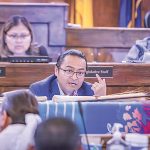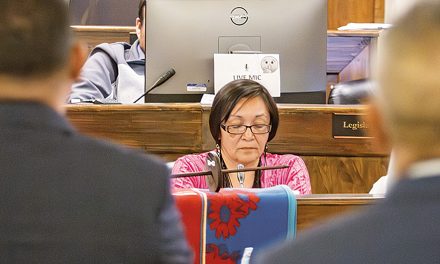
50 Years Ago: MacDonald calls halt to ROWs for TG&E transmission line
For the past couple of years, Tucson Gas and Electric Company representatives were making plans to build an electrical transmission line east and west through the Navajo Reservation.
It was a major undertaking with the company having to get rights-of-ways across more than 20 chapters.
Everything seemed to be going smoothly until Navajo Tribal Chairman Peter MacDonald this week called for a freeze on all rights-of-way approvals. In doing so, he mentioned controversies surrounding approval of the TG&E proposal.
The proposal had come under fire from a number of grassroots organizations on the reservation as well as by Navajo ranchers who worried that electrical lines would have an adverse effect on livestock.
There were all kinds of rumors circulating on the reservation that the electrical lines would create sterility in cattle and sheep. One group was even spreading rumors that living near one of the electrical lines would cause deformities in newborn children.
In light of all of these ill-founded rumors, MacDonald decided to call a shutdown of all tribal approvals until more studies could be done on the effect the lines would have on the Navajo environment.
“This study is necessary,” said MacDonald, “because past experiences where rights-of-ways were granted with inadequate study resulting in unnecessary destruction of Navajo resources or inadequate compensation was given to the tribe or individual members of the tribe.”
MacDonald faces charges
The issue of inadequate compensation would later have a serious effect on MacDonald’s reputation as federal charges were later filed against MacDonald claiming TG&E had given him a bribe to assure approval of the proposal. MacDonald faced the possibility of a federal prison sentence if found guilty.
He denied any wrongdoing and rejected any talk of a plea agreement. Instead, he had the tribe hire one of the best and most famous defense attorneys in the country, F. Lee Bailey, to defend him.
The government had solid proof that the company had paid him (I think it was $10,000) by way of bank records and testimony from company officials.
MacDonald even admitted it but claimed the money was given by the company to help his re-election and it had nothing to do with the tribe’s approval of the transmission.
A week-long trial in Phoenix ended in the jury unable to arrive at a verdict so the judge had to call a mistrial.
While it was doubtful that the federal government would go through the effort and expense of another trial, the issue became moot when the judge in the case dismissed the lawsuit, saying that the government would have a hard time proving the money was a bribe or a contribution to his campaign.
But if MacDonald was being truthful, he had broken all kinds of tribal laws which prohibited Navajos running for a tribal position from accepting contributions from a non-Navajo.
With MacDonald controlling all aspects of the tribal government at the time as chairman, there was no serious attempts to bring him up on tribal charges in the matter.
To be truthful, non-Indian contributions to members of the tribe running for Tribal Council or chairman was something that occurred in every election to some extent or another. And no one was ever brought up on it.
Lottery for Vietnam
I have written over the years a lot of stories about the patriotism of young Navajos and the fact that many after high school and college signed up to fight for this country in the Vietnam War.
This came to mind when a notice from the Selective Service Board in St. John’s provided another way to do this.
Since 1969, a lottery was held in which the order of those being drafted would depend on one’s birthday and to make this fair for everyone, all of the dates in 1972 were put in a drum and someone would draw the dates to determine in what order they would be drafted.
The Navajo Times had publicized the lottery in the past and had given a list of the order that men would be drafted.
Members of the Selective Service Board in St. Johns pointed out there were a number of young county residents who had been given a deferment for one reason or another, mostly to attend college, but that deferment would end in 1972, making them eligible to be drafted in that year.
One aspect of the lottery is that you were in it for only one year and if your birthday was high enough on the list, you would not have to fear being drafted.
The board strongly suggested that if you had a deferment for 1972 and your birthday was high on the list for that year, it may be in your best interest to drop the deferment and declare yourself eligible to be drafted that year.
The board pointed out that in 1971 the board had only gotten to 125 on that list so anyone who had a draft number of 130 or higher should be safe in 1972 from the draft.
Chet MacRorie, the Times managing editor, publicized the story heavily and a month later he checked in with the selective service office and learned that 22 men dropped their deferments. None of them were Navajo.
This all became moot as the Vietnam War was winding down and 18 months later, it was over.








 Highway 264,
Highway 264, I-40, WB @ Winslow
I-40, WB @ Winslow